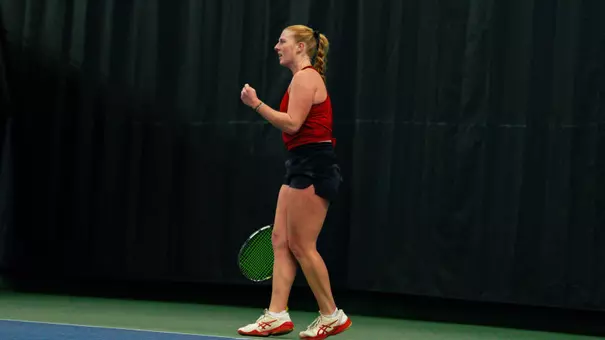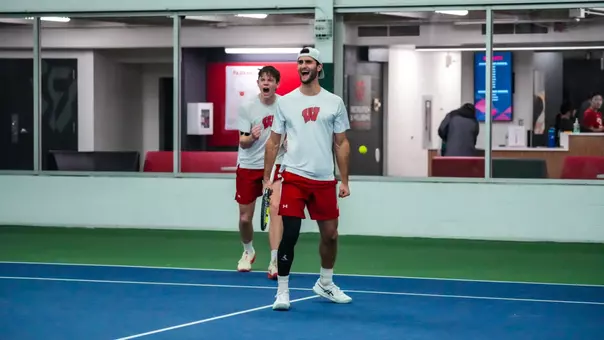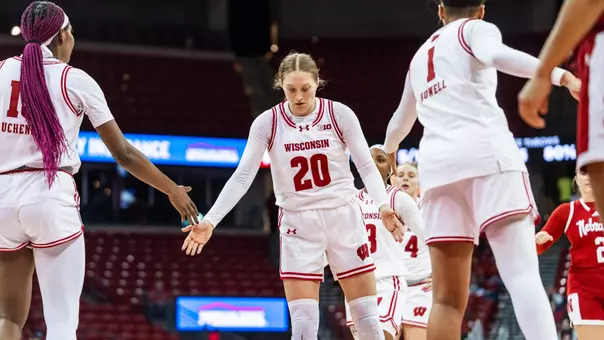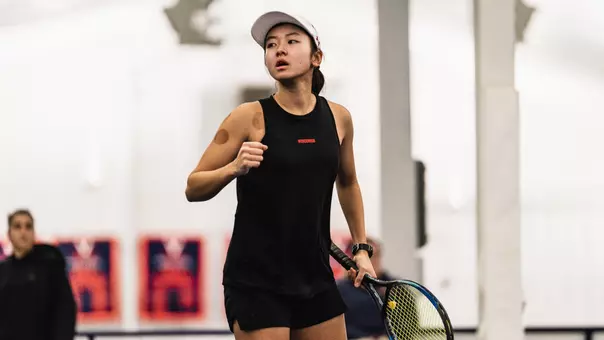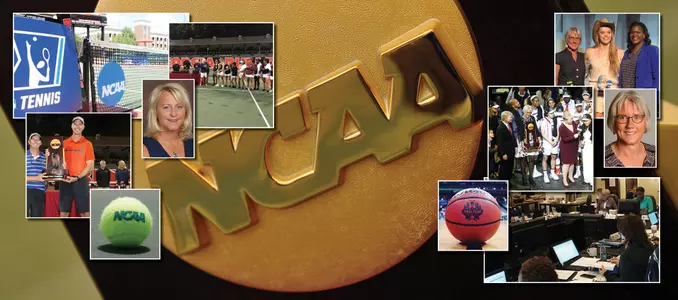
NCAA leadership provides challenges, joys
August 28, 2017 | General News, Men's Tennis, Women's Basketball, Women's Tennis, Andy Baggot
Wisconsin senior associate athletic directors Terry Gawlik and Marija Pientka look back on rewarding experiences of serving as NCAA committee chairs
 |
||
|
BY ANDY BAGGOT
UWBadgers.com Insider
MADISON, Wis. — When you embark on a largely thankless task it helps to have someone in your corner who can relate to being underappreciated.
That helps explain the slightly worn path between the offices of Terry Gawlik and Marija Pientka on the fifth floor of the University of Wisconsin Athletic Department's Kellner Hall.
Gawlik, the Wisconsin senior associate athletic director for sports administration, is headquartered at the opposite end of a long corridor from Pientka, the UW senior associate athletic director for sport administration.

Their need to communicate goes beyond their vital roles in the department. During the 2016-17 school year, it also involved them serving as NCAA committee chairs.
Gawlik was in charge of women's basketball, while Pientka was the overseer for women's tennis. Both spent a year as chairs after serving multi-year stints as committee members. Both saw their appointments end this summer.
For Gawlik it was her third different assignment as NCAA committee chair. Previously she directed volleyball and men's soccer.
For Pientka it was her first go-round on the front lines of overseeing an NCAA sport committee.
"We talked all the time," Gawlik said of Pientka.
"She was really helpful to me, early on, learning the process," Pientka said of Gawlik.

The two long-time UW athletic administrators — Gawlik has been in her current role since 2005; Pientka has been a senior staffer for the last 11 years — had a variety of shared experiences.
Both became more acquainted with managing people with different visions. Both gained insight into working with NCAA officials, brand partners and the media. Both expanded their horizons as far as becoming spokespersons for a championship enterprise. Both learned how to juggle the unpaid duties of being an NCAA committee chair — travel, research and communications — with family matters.
After four years as a committee member, Gawlik spent the last year in the highly visible role of spokesperson for women's basketball. Her defining task was coordinating the process of seeding and aligning the 64-team NCAA tournament field, but that's one item on a long to-do list.
"There's a lot that goes into being on the committee," Gawlik said. "It's not just picking the brackets, seeding. There's a lot of things behind the scenes.
"It's always interesting when you're a chair. You're not only doing what your job is by watching the games and being educated on what teams should be going in and how they should be seeded. You're also running the meetings and making sure that everybody has the opportunity to state their opinions.
"You've got to manage the nine other people in the room and the NCAA staff. You've got to be willing to be a spokesman for the committee in general."
Gawlik said the assignment is one of the best she's had outside of her role with UW Athletics.
Why?
"I like challenges," she said, noting all the diverse opinions that come from fellow administrators and committee members as well as coaches and media outlets. "It's very challenging."

Of course, the most prominent task involves putting together the NCAA tournament brackets and then stepping under the stage lights at ESPN to explain the methodology.
"The committee took a lot of heat for where we seeded people this year," Gawlik said. "At the end of the day it shook out pretty much how we had it."
A lot goes into properly assessing the field.
"I watched 300 games and I'm not talking about two minutes of it," Gawlik said. "I'm talking 300 games. That's a lot. And I don't watch them here at work because that's not my job when I'm at work."
Gawlik said games she saved on DVR were seen on flights and weekends while "power-watching walking around the house."
The women's Final Four produced an unforgettable script and Gawlik reveled in its drama.
Perennial powerhouse Connecticut came into the semifinals looking for its fifth consecutive NCAA title, riding the wave of a record 111-game winning streak.
But Mississippi State eked out a dramatic 66-64 overtime victory before falling to South Carolina 67-55 in the title game.
Instead of handing the championship trophy to legendary UConn coach Geno Auriemma for the 12th time since 1995, Gawlik presented it to Gamecocks coach Dawn Staley for the first time.
"That was incredible, it really was," Gawlik said of the Final Four experience.

The event was overwhelmed by a pre-tournament debate about whether the Huskies' dominance was good or bad for the women's game.
"Everybody there, everybody that saw it was like, 'This is the best thing that ever happened for women's basketball right now,'" Gawlik said.
How is Gawlik better for the experience?
"It allows you to, in the end, help the student-athlete experience in many ways," she said. "That's the whole reason I participated in any NCAA committee that I was on.
"You're doing it because you want to give back to the game. This is part of, in my opinion, what athletic administrators should be a part of."
Would Gawlik serve on the women's basketball selection committee again?
"If I hadn't done it? Yes," she said. "But no, I'm not interested in doing it again."
Pientka, a UW women's tennis All-American in 1992, has different instincts.
Would she do it again following three years as a tennis committee member and one year as chair?
"For sure," she said.
"It was a lot of fun being on the committee because we had real meaty work to do that was changing the nature of the game.
"It was personally gratifying as a former collegiate tennis player to be involved in discussions and be involved with vetting that.
"I think we've made some strategic changes to keep collegiate tennis relevant."

Pientka is referring to a fundamental change in scoring — no-ad — that was debated for several years before going into effect in 2016.
In short, when games are tied at 40-40 — deuce — the winner of the next point wins the game. The revision is designed to reduce the length of matches for the student-athletes and fans.
"It's been a betterment to the game. It's improved the college game,'' Pientka said.
Prior to the change, Pientka said some matches lasted three to four hours.
"The reason it was done was with an eye toward student-athlete welfare, fan experience and TV exposure," she said. "It's made the game more exciting. It's had a positive impact on the student-athletes."
The tennis committee also worked with coaches to make a significant change to the 64-team national championships. Starting in 2019, a 'super regional' featuring the final 16 teams will be played on college campuses with the eight winners advancing to the final site. Previously first and second rounds were played on campus with the final 16 teams advancing to the finals site.
Pientka said her time on the committee helped her bring the bigger picture into focus.
"I have a broader perspective now," she said. "I've worked at a large public institution in a major conference, so I have that lens.
"But when you're on a sport committee and you're administering a championship for 64 teams and 64 individual players and 32 doubles teams that literally come from every size institution, it's given me an understanding of different viewpoints and different realities for different programs.
"That's helped me."

Pientka said the highlight of her tenure — her stint as committee chair came 25 years after she teamed with Amanda Gregory to earn breakthrough All-America honors in doubles for UW — was her surroundings.
"It sounds cliché, but just getting to work with coaches and student-athletes who are the best in their sport," Pientka said.
"The semifinals of every national team championship I've been to has literally brought me to tears. Play was so good, so classy, you didn't want to see a loser."
Pientka said having an NCAA committee veteran like Gawlik just down the hall was a luxury.
"Terry was great," Pientka said. "She's served on so many national committees."
Gawlik's insights were especially welcome when it came time to change the scoring format.
"There's a lot of steps, a lot of hoops," Pientka said. "But that's good to have checks and balances."
Pientka said being on an NCAA committee helps in her role as a UW athletic department administrator.
"There's visibility that comes up when you're chairing a sport committee meeting or presenting to the USTA," she said. "It does help this university.
"It helps grow our network around the country. When we are hiring a coach or support staff, we can turn to colleagues for insight and recommendations.
"Bottom line, it was a lot of work," Pientka said, "but it was a lot of fun."

